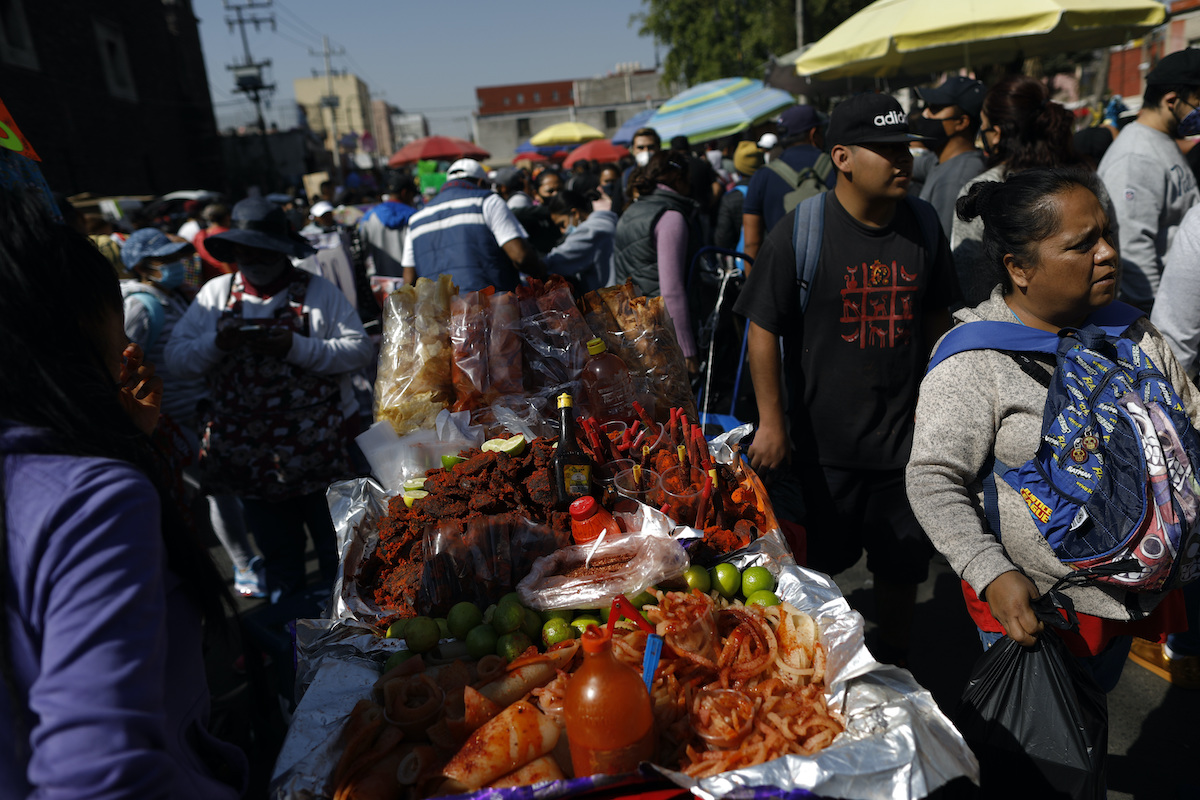

Shoppers and vendors mingle amid the COVID-19 pandemic in an informal street market in central Mexico City, Tuesday, Janury 5, 2021. (AP Photo/Rebecca Blackwell)
By MARÍA VERZA, Associated Press
MEXICO CITY (AP) — Once Mexico has vaccinated its frontline medical workers against COVID-19, the government will turn its attention to the elderly living in its most remote places, President Andrés Manuel López Obrador said Tuesday.
Ten thousand brigades made up of medical personnel and health promoters with security provided by the National Guard will target 3 million senior citizens in rural areas. The brigades will work back from isolated areas to towns and cities.
The plan will hinge on Mexico’s approval of the Chinese CanSino vaccine, which only requires a single dose and doesn’t require ultra-cold storage. So far, Mexico has approved only vaccines from Pfizer and AstraZeneca.
Mexico reported a near-record 11,271 new coronavirus cases Tuesday and 1,065 COVID-19 deaths. Mexico has now seen almost 1.47 million cases and 128,822 deaths in total. The highest one-day case report was 12,511 in mid-December.
Mexico started deploying those vaccines December 24 in Mexico City and the northern state of Coahuila. The government hopes to have 750,000 front-line health workers vaccinated by the end of January.
Mexico started deploying those vaccines in December in Mexico City and the northern state of Coahuila. The government hopes to have 750,000 front-line health workers vaccinated by the end of January.
“We’re going to start at the bottom, where the most marginalized people live,” López Obrador said of a population that makes up an important part of his political base.
The president said teachers in states where it could be possible to return to in-person classes would also be vaccinated at that time.
The pace of the vaccine rollout, however, has been slow, with just over 4,000 shots administered Tuesday.
Much will depend on the availability of the vaccines. CanSino has not yet presented the results of its final stage trials, which would be needed for emergency approval.
Experts said it would be more efficient to focus the first vaccine efforts on elderly people living in urban areas, both because they are easier to reach and because they live closer together and have a higher risk of infection. Under López Obrador’s plan, the experts said, a time-consuming and difficult campaign will be required to reach the rural elderly.
“The only explanation I see (for the plan) is a political one,” said Miguel Betancourt, president of the Mexican Society for Public Health. “They are a target population for the president’s policies.”
“In fact, the president himself said that vaccines will be administered at the same sites used to distribute (government) pensions,” Betancourt said. “I give you your vaccine, and I give you a handout.”
Mauricio Rodríguez, a professor at the medical school of the National Autonomous University of Mexico, said starting in rural areas would only make sense if it involved the easier-to-use CanSino vaccine. Otherwise, he said, starting in urban areas with more cases would make more sense.
Mexican officials have expressed concern in the past that false vaccines could be offered or advertised, and on Tuesday the Caribbean coast state of Quintana Roo, home to beach resorts like Cancun, alerted residents that fake “vaccination teams” had been reported in the state.
The teams reportedly visited homes and asked people for copies of their ID cards, as a purported requirement to sign up for shots. The state health department said the teams are fraudulent and urged people not to give them any information. Such documents have been used in the past for electoral fraud and identity theft.


